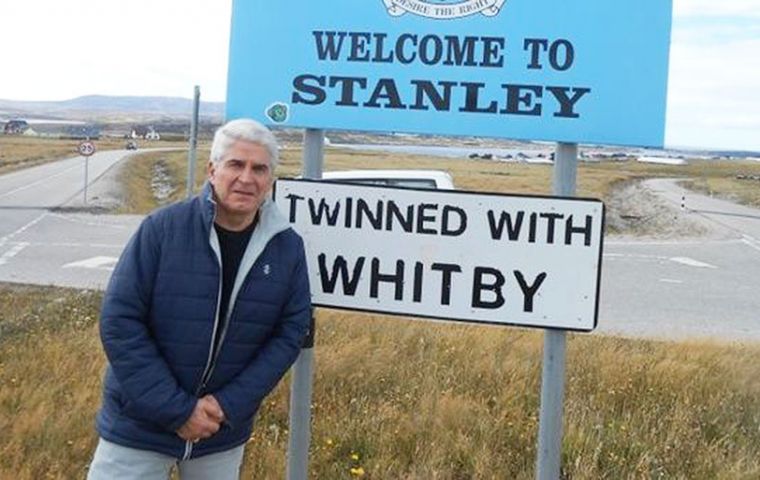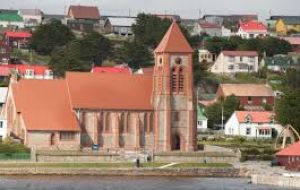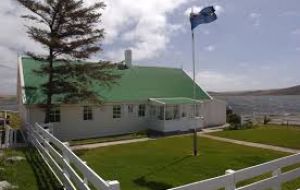MercoPress. South Atlantic News Agency
Falklands: “Commercial and cultural office” in Stanley to promote Argentina, suggests ex diplomat
 Jorge Lidio Viñuela during a visit to the Falkland Islands, pictured at an iconic signboard at the entrance of Stanley
Jorge Lidio Viñuela during a visit to the Falkland Islands, pictured at an iconic signboard at the entrance of Stanley  Stanley the capital of the Falklands, where Viñuela suggests Argentina should open a Commercial and Cultural Office
Stanley the capital of the Falklands, where Viñuela suggests Argentina should open a Commercial and Cultural Office  Viñuela names top of the list, Lisa Watson, Editor in Chief of the Penguin News, as well as obviously members of the Legislative Assembly.
Viñuela names top of the list, Lisa Watson, Editor in Chief of the Penguin News, as well as obviously members of the Legislative Assembly.  Gilbert House, the seat of the Legislative Assembly, which is the elected government of the Falklands
Gilbert House, the seat of the Legislative Assembly, which is the elected government of the Falklands The Falklands population is crucial for any solution to the Argentine claim over the Islands given their overwhelming support from British public opinion (and political system), and its full integration with the 53-nation Commonwealth, according to Argentine ex diplomat Jorge Lidio Viñuela, considered an expert and militant on the issue of South Atlantic insular claims.
Given this scenario, Viñuela recalls that in only fourteen years time it will be 200 years since England took control over the Falklands/Malvinas (3 January 1833), “usurping” territory from the River Plate United Provinces. It would also be an excellent moment for the Crown, taking advantage of the anniversary, to decide the Falklands' independence, which could take Argentina totally by surprise and thus it must start working to prevent such a situation, with “concrete, effective and realistic” measures to sincerely extend amicable links with the Falklands' population, “the true protagonists of this colonial process”.
Viñuela remembers that much of this happened during the sixties and seventies with for example many islands in the Caribbean which became independent from London: Trinidad and Tobago (1976), Santa ucia (1979), St Vincent & Grenadines (1979), Grenada (1974) and Barbados (1966), among others. And what about the international support for an independent Falklands? Far more than expected because of its close links with the Commonwealth, many of 53-nation organization will recognize the sovereignty of the new nation, and Viñuela then names a list of countries, Canada, Australia, New Zealand, Belize, Jamaica, Trinidad Tobago, Barbados, India, Nigeria and South Africa and recalls that during the 1982 conflict, Australia was effectively supportive of the UK Task Force, New Zealand cut diplomatic relations with Argentina, Canada withdrew its ambassador in Buenos Aires and publicly expressed support for Britain.
Likewise France and Holland with their own “Malvinas” colonial assets, and to remain coherent with their foreign policies, Viñuela speculates, they would support the new situation and even follow along similar steps, while the rest of Europe and even the United States, with time, would accept such a scenario.
So, what must be done? The former diplomat suggests setting up an office in Stanley, similar to that Argentina (and many other countries) have in Taipei, Taiwan which would operate under the pompous name of “Commercial and Cultural Office”, with the purpose of besides promoting trade, encouraging close people-to-people relations in fields such as culture, sports, academia and inviting opinion makers from the Falklands to Argentina.
Viñuela names top of the list, Lisa Watson, Editor in Chief of the Penguin News, as well as obviously members of the Legislative Assembly.
Viñuela ends his piece “The independence of the Malvinas” arguing that it has been repeatedly proven that as long as Argentina continues to ignore the Islanders, the status quo will remain unchanged, ”until one day we will read in the media, with stupor that the Malvinas have declared independence from the British Empire, remaining in the British Commonwealth of Nations.




Top Comments
Disclaimer & comment rules-

-

-

Read all commentsJorge Lidio Viñuela appears to live in a surreal world. The people of the Falklands may one day decide upon independence, but it is not up to the 'Crown.'
Apr 25th, 2018 - 03:25 am +6This article would seem to have come from this Spanish language one -
https://observatoriomalvinassite.wordpress.com/2018/04/20/la-independencia-de-las-malvinas/
Why is it that everyone else seems to have the solution to the Falkland Islands dispute totally ignoring the wishes of the Islanders.
Apr 25th, 2018 - 07:07 am +6We would not survive independence status because as soon as that was declared Argentina would once again invade us and unless we had strong military support from Countries who believed in our independence wishes , Argentina would colonise us and that gets back to the precise issues we are stuck in today. Colonization.
Argentina believes we are a colony of Great Britain and they are the ones wanting Britain to hand over what they say is a place that Britain has colonised. Yet Argentina want to do the same.
The only solution to the whole situation would be for Argentina to drop this ridiculous claim to our Country and let the Falkland Islanders live the life of their choosing, Until then we Islanders will never have relations with them on the level that they so want because we, the Falkland Island people know exactly what Argentina wants, It is the huge financial wealth that we have surrounding us and until the day comes when we have exploited that wealth Argentin will always be doing everything they can to get their hands on it. As a people we do not matter to them and they have demonstrated that for many years.We do not exist in their eyes. We chose a British way of life and it is our right to be able to live that life without fear or pressure from any other Country in the world.
It is time to stop the we have the solution arguments and just let us the inhabitants decide the path we want to take. End off.
People not from the Falklands can waffle all they want: it is the Islanders who decide.
Apr 25th, 2018 - 07:46 am +6Commenting for this story is now closed.
If you have a Facebook account, become a fan and comment on our Facebook Page!